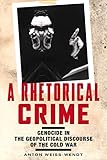A Rhetorical Crime : Genocide in the Geopolitical Discourse of the Cold War / Anton Weiss-Wendt.
Material type: TextSeries: Genocide, Political Violence, Human RightsPublisher: New Brunswick, NJ : Rutgers University Press, [2018]Copyright date: ©2018Description: 1 online resource (272 p.)Content type:
TextSeries: Genocide, Political Violence, Human RightsPublisher: New Brunswick, NJ : Rutgers University Press, [2018]Copyright date: ©2018Description: 1 online resource (272 p.)Content type: - 9780813594651
- 9780813594699
- 345/.0251 23
- online - DeGruyter
- Issued also in print.
| Item type | Current library | Call number | URL | Status | Notes | Barcode | |
|---|---|---|---|---|---|---|---|
 eBook
eBook
|
Biblioteca "Angelicum" Pont. Univ. S.Tommaso d'Aquino Nuvola online | online - DeGruyter (Browse shelf(Opens below)) | Online access | Not for loan (Accesso limitato) | Accesso per gli utenti autorizzati / Access for authorized users | (dgr)9780813594699 |
Frontmatter -- Contents -- Foreword -- Introduction -- 1. Soviet Scholars of International Law as Foot Soldiers in the Cold War -- 2. Trial by Word: The Gulag Condemned -- 3. Soviet Satellites Shift Allegiances: Hungary, Yugoslavia -- 4. The Struggle for Influence in Postcolonial Africa and the Middle East: Algeria, Congo, Nigeria, Iraq -- 5. Southeast Asia and the Rise of Communist China: Tibet, Bangladesh, Cambodia -- 6. (Soviet) Piggy in the Middle: American Liberal Left versus Radical Right on US Ratification of the Genocide Convention -- 7. Moscow Taps the New Left: The Vietnam Antiwar Movement, Black Panthers, the American Indian Movement -- 8. Soviet-Turkish Relations and Socialist Armenia -- 9. The Israeli-Palestinian Conflict -- 10. An Uncertain End to the Cold War and the Reactivation of the Genocide Treaty -- Conclusion -- Afterword: Genocide Rhetoric and a New Cold War -- Appendix A: Articles in Pravda with Reference to Genocide, 1948-1988 -- Appendix B: Articles in the New York Times with Reference to Genocide, 1948-1988 -- Acknowledgments -- Notes -- Bibliography -- Index
restricted access online access with authorization star
http://purl.org/coar/access_right/c_16ec
The Genocide Convention was drafted by the United Nations in the late 1940s, as a response to the horrors of the Second World War. But was the Genocide Convention truly effective at achieving its humanitarian aims, or did it merely exacerbate the divisive rhetoric of Cold War geopolitics? A Rhetorical Crime shows how genocide morphed from a legal concept into a political discourse used in propaganda battles between the United States and the Soviet Union. Over the course of the Cold War era, nearly eighty countries were accused of genocide, and yet there were few real-time interventions to stop the atrocities committed by genocidal regimes like the Cambodian Khmer Rouge. Renowned genocide scholar Anton Weiss-Wendt employs a unique comparative approach, analyzing the statements of Soviet and American politicians, historians, and legal scholars in order to deduce why their moral posturing far exceeded their humanitarian action.
Issued also in print.
Mode of access: Internet via World Wide Web.
In English.
Description based on online resource; title from PDF title page (publisher's Web site, viewed 30. Aug 2021)


